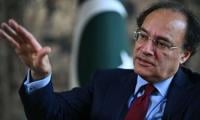ISLAMABAD: With placement of seven major conditions for undertaking structural reforms, the World Bank has approved a $500 million (Rs84.16 billion) loan for the Resilient Institutions for Sustainable Economy (RISE) programme in Pakistan to help recover from COVID-19 pandemic.
“The Centre and provincial governments have signed agreement for harmonisation of General Sales Tax (GST) on goods and services paving the way for approval of $500 million under RISE programme from World Bank. The next step will be to work out the minute details that will be finalised by National Tax Council (NTC) having representation of both from federal and provincial governments,” top officials told The News on Tuesday.
In a separate but important development, the SBP has received $1.3 billion (approx Rs219 billion) as GOP loan disbursements from Chinese banks this week. This brings the total amount of official inflows received since 23rd June to around $3 billion,” the SBP stated in a tweet.
Official sources said that it was the condition of the IMF programme that Pakistan must have rollover of bilateral loans deposits from China, Saudi Arabia and UAE. Pakistan had returned loan amount of $1.5 billion in May to Chinese banks but received the same amount probably on June 26.
However, the WB for preparation of document for $500 million loan stated, “Political risks are high because in the past, reforms that seemingly benefited from broad support stalled because they challenged an existing equilibrium of power and those benefiting from the status quo. These risks are partly mitigated through efforts to secure buy-in from political leaderships across the spectrum. Institutional risks are high because of weak federal-provincial coordination and technical capacity on taxation and fiscal policy. These risks are mitigated, in part, through taking an all-of-government approach by engaging with the federal government and provinces address longstanding and long-delayed structural reforms, strengthening of institutions responsible for inter-governmental coordination, and provision of technical assistance for implementation.
The WB states that policy measures supported by the operation are expected to have positive effects on poverty and social welfare in the medium-term. The policy action on reducing the anti-export bias of the National Tariff Policy is expected to have a positive welfare impact on Pakistani households and on the issuance of regulations for electronic money institutions (EMI) and granting of licences to EMIs to increase the use of digital payments is expected to have a pro-poor and gender effect.
“The only action that may have a negative impact in the short-term is related to measures included in the FY-20 budget to broaden the tax base, the increase in the immovable property valuation for tax purposes and the reduction in the personal income tax threshold,” it further stated.
Other policy actions are expected to have positive poverty and social impacts through securing macroeconomic stability, promoting economic growth and competitiveness. An analysis of the welfare impact of addressing the stock and flow of circular debt in the power sector will be conducted with the new HIES 2018-19 data and will be used to inform ex-ante the reforms on energy subsidies, and tariff determination, which will be supported by future operations.
“Pakistan is suffering a significant fiscal shock from the economic fallout from the pandemic and the increased spending on crisis response, including emergency healthcare, social protection, and business support,” said Illango Patchamuthu, World Bank Country Director for Pakistan.
“The RISE programme supports the government efforts to achieve macroeconomic stability, accelerates long-delayed policy reforms, and sets the course for a strong and competitive economy.”
For key results of the programme, the WB states that the operation will support the government’s efforts to maintain macroeconomic stability and build fiscal buffers to respond to the on-going COVID-19 pandemic so as to ensure stronger and faster recovery.
These reforms will also set the foundations for achieving sustainable growth as envisaged under “Pakistan@100 Shaping the Future”. Reforms completed and the results achieved are in the first pillar are: (i) improving fiscal policy and sustainability by establishing effective institutions and strengthening intergovernmental arrangements, (ii) enhancing debt transparency and management, (iii) broadening the tax base by reducing distortions in tax policy, and (iv) setting foundational reforms for improving the financial viability of the power sector through a strategy to address the sector’s circular debt and policies to facilitate the development of low carbon resources: (iv) harmonising the general sales tax across the country, (v) ensuring that all bank accounts are biometrically verified and non-banks can deploy electronic money platforms, (vi) promoting better regulated real-estate developments, and (vii) lowering barriers to the formalisation of firms.
Some of the measures in this area include the establishment of the fiscal policy office; preparation of budgets that are aligned with the medium-term fiscal framework; enhanced debt transparency and management; a broadened tax base; and efforts to improve the financial viability of the power sector through the circular debt reduction management plan and policies to facilitate the development of low carbon energy resources. Collectively, these will reduce the burden on the government’s finances and provide additional fiscal space to better deliver social services. For stronger recovery post-COVID-19 and to support growth, the proposed operation will help harmonise the goods and services tax framework which will reduce the regulatory burden and create a harmonised tax jurisdiction. The operation also supports increased use of digital financial services, enhanced integrity in the financial sector, and a reduction in the anti- export bias of the national trade tariff policy.
“RISE supports reforms such as harmonising sales tax and making the trade tariff structure more competitive. This could help the country attract new investments and spur economic recovery,” said Shabih Mohib, Lead Country Economist for the World Bank.
“Taken as a whole, we hope that RISE can build a foundation for sustainable growth driven by the private sector,” he said.
Commercial and business chartered flights flying from US to India and vice versa fly over Pakistan
Put into bat, the Qalandars never truly found their rhythm, collapsing to 139 all out in the final over
Justice Muhammad Ali Mazhar remarked that “we should resolve the case of judicial appointments now”
Court notes deputy registrar has no powers to withdraw case from one bench and assign it to another
At outset of NA session, just prior to Question-Hour, PTI legislator Iqbal Afridi pointed out quorum
Funding shortfall means we are looking to regroup to an organisation of around 2,100 staff, says Fletcher







